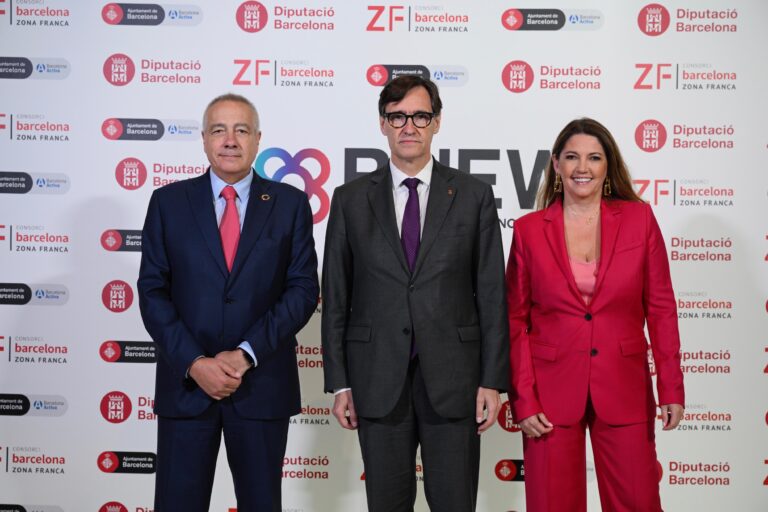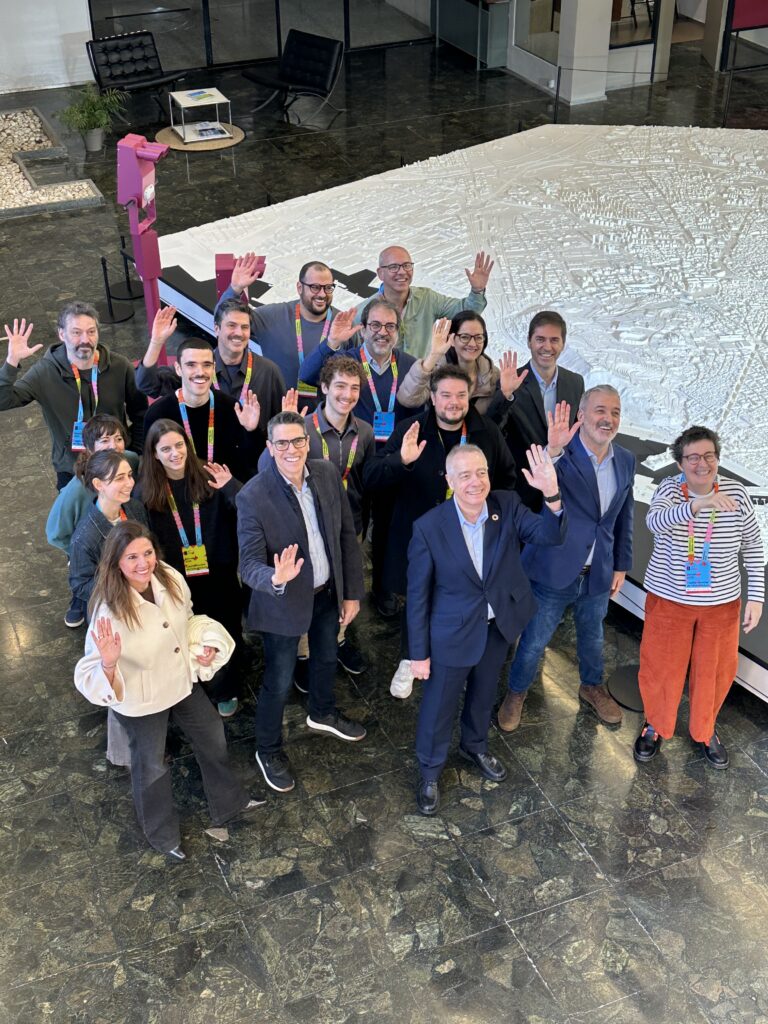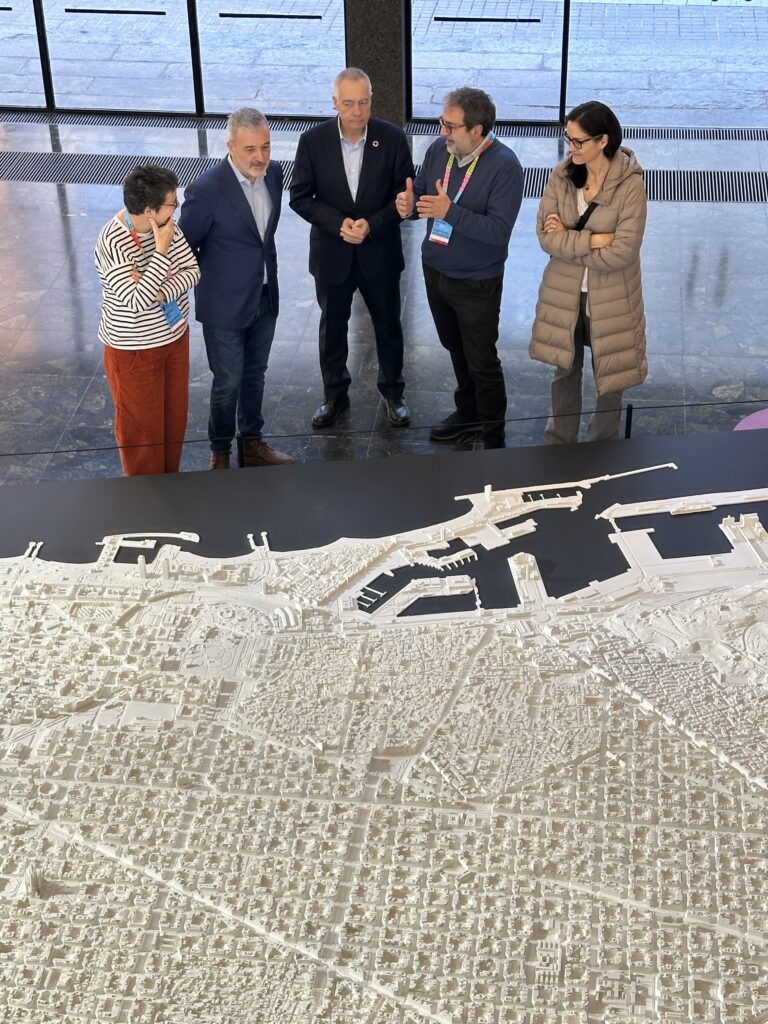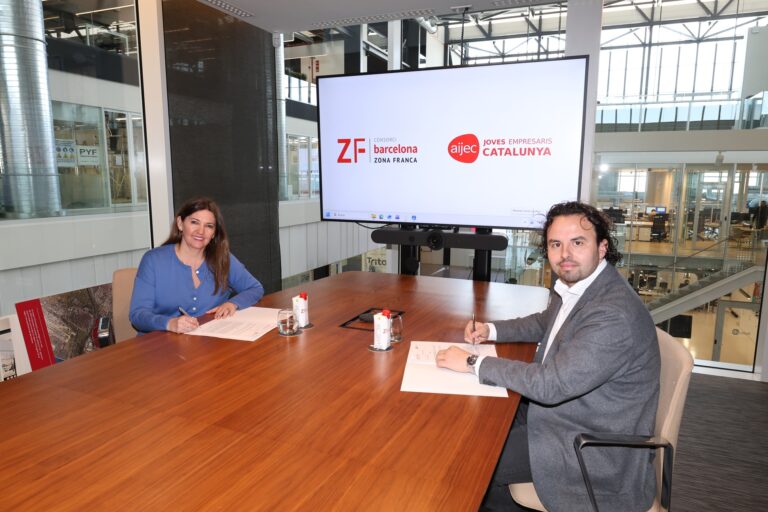President Salvador Illa inaugurates the most disruptive event of the new economy

7 de October de 2024
- The opening ceremony of Barcelona New Economy Week (BNEW 2024) was also attended by the Minister of Industry and Tourism, Jordi Hereu; the Deputy Mayor of Barcelona City Council, Jordi Valls; the special delegate of the State in the Consorci de la Zona Franca de Barcelona (CZFB), Pere Navarro, and the general director of the entity, Blanca Sorigué.
- The European law on Artificial Intelligence and the current state of the Sustainable Development Goals of the United Nations 2030 Agenda are the focus of interest on a first day with a large influx of professionals.
- The Zona Franca de Barcelona is presented with the purpose of being District 4.0 of the Metropolitan Region of Barcelona to become the great international benchmark for the digital transformation of the industry.
Barcelona, 7 October 2024.- The fifth edition of Barcelona New Economy Week (BNEW), promoted by the Consorci de la Zona Franca de Barcelona (CZFB), has officially opened this morning with the verticals dedicated to mobility, digital industry and sustainability, and which from Wednesday 9 October will give way to those of talent, aviation and health. Throughout these 4 days, a total of 350 speakers distributed in more than 100 sessions will address the keys, challenges and opportunities of the new economy that can be followed in person, at DFactory Barcelona, or online, through the BNEW digital platform.
Opening ceremony of the 5th edition
The opening ceremony of BNEW 2024 was chaired by the President of the Generalitat de Catalunya, Salvador Illa, who was accompanied by the Minister of Industry and Tourism, Jordi Hereu; the deputy mayor of the Barcelona City Council, Jordi Valls; the special delegate of the State in the Consorci de la Zona Franca de Barcelona, Pere Navarro, and the general director of the entity, Blanca Sorigué.
Blanca Sorigué, general director of the CZFB, welcomed all the authorities as well as the in-person and online public participating in this edition of BNEW. Sorigué highlighted the importance of BNEW “which in just 5 editions has already become the great global event of the new economy with the attendance of professionals from 106 countries thanks to the digital platform of the event that makes it possible for them to follow us from anywhere in the world”. The general director of the CZFB added that “BNEW is an event that reinvents itself every year by focusing on innovation, the key to our success, which has made us a unique and singular event in the world, as there is no other proposal like that of the Barcelona New Economy Week”.
Pere Navarro, special delegate of the State at the CZFB, stressed that “the Barcelona New Economy Week is proof that, when we connect ideas, sectors and people, the results are extraordinary. Over the next 4 days, technology, innovation and talent will come together at DFactory Barcelona, the cathedral of industry 4.0, to build the future”. Navarro also explained that “BNEW was born in 2020 and since then almost 11.800 trillion patents have been registered worldwide. This figure is a very graphic example of how fast everything is evolving today and how the world has changed in just 4 years, so we are living a key moment for social and economic development”.
For his part, Salvador Illa, president of the Generalitat of Catalonia, stressed that “BNEW has already made a place for itself in Catalonia, Spain and the entire international network. Its 7 verticals show us where business decisions are heading and show us those positive solutions that corporations have implemented. And the space where it is held, the DFactory Barcelona, cannot go unnoticed: it is a modern space that will be expanded, and that responds to the Catalan tradition of innovating, of trying new things”.
The Minister of Industry and Tourism of the Government of Spain, Jordi Hereu, wanted to highlight during the opening ceremony that “the Government supports the BNEW, hybrid in its format, because it wants to interconnect many professionals who are here and around the world. The exchange of experiences and knowledge is very important, and we align ourselves with the need and capacity to support innovation, business growth and the creation of new companies and solutions”.
Finally, Jordi Valls, deputy mayor of the Barcelona City Council, said that “the strategy of the city of Barcelona is the need to generate collaborative ecosystems, the ability to talk to each other about different challenges and create networks of connection between different sectors. At BNEW we will talk about all the challenges we have as a society, whether it is infrastructure, housing, aviation, social equity, and many more”.
The four-day celebration of BNEW features seven verticals that have a high impact on digital transformation on a global scale. Panels and activities for the Digital Industry, Mobility, and Sustainability verticals are taking place on 7 and 9 October, while conferences and discussions for Aviation, Health and Talent take place over the next two days, 9 and 10 October.
European AI law opens a new era
One of the conferences that has aroused the most interest has been the one that has analyzed the transformative impact of the European Artificial Intelligence Law, a pioneering legislation that seeks to regulate the use of AI on the continent. This law establishes an ethical and legal framework for the development and implementation of AI technologies, prioritizing security, transparency, and the protection of fundamental rights. Moderated by Joana Barbany, president of the Digital Hub of Catalonia, this session was attended by David Garriga, CEO and founder of SIRT, Montserrat Guardia, President of the UPC Social Council / Chief People & Culture Officer at IDEADED, Alexandra Lillo, Legal Affairs staff of the Observatory of Ethics in Artificial Intelligence of Catalonia, and Lali Soler, director of the Digital Area of the Eurecat Foundation.
The roundtable discussed the regulatory framework of the new law, which will indicate the four levels of protection of AI and its guarantee of human rights. It also highlighted the importance not only of the commercialization of the law as such, but also the human, anthropological part of it, its technological weaknesses and biases, and the different levels of risk of AI when working and producing with it.
Barcelona’s Zona Franca moves towards District 4.0
Especially interesting was the session “Innovation districts, engines of transformation” where it was discussed how the Innovation Districts are acting as a driver of territorial, economic and social transformation, presenting the success stories of the 22@Barcelona and District 4.0 of the Zona Franca Barcelona. This panel, moderated by the general director of the CZFB, Blanca Sorigué, and in which the deputy mayor of the Barcelona City Council, Jordi Valls, the special delegate of the State in the Consorci de la Zona Franca de Barcelona, Pere Navarro, and the executive president of La Salle Technova Barcelona, Josep Miquel Piqué, participated, stressed that innovation districts are open spaces that encourage collaboration and are based on talent, generating opportunities for their territories.
The Consorci de la Zona Franca de Barcelona has explained that it is working with the purpose of being District 4.0 of the Metropolitan Region of Barcelona to become the great international benchmark for the digital transformation of the industry. The special delegate of the State at the CZFB, Pere Navarro, stated that “DFactory Barcelona is already the industry 4.0 ecosystem of international reference with the presence of more than 30 companies in robotics, 3D printing, AI, IoT, sensors, augmented and virtual reality, nanotechnology, blockchain… We want the spirit of the DFactory to permeate the whole of Barcelona’s Zona Franca, a space of almost 6 million square meters, to be the great District 4.0 that positions our territory as the Silicon Valley of industry 4.0”.
For his part, Jordi Valls, deputy mayor in the Barcelona City Council, stressed that “to remain competitive, we need a metropolitan vision in terms of infrastructure, sustainability and housing. We compete globally in key sectors such as biotechnology and health. We have a strong industrial ecosystem that represents 20% of the city’s GDP and we are poised to be a leader in Europe’s industrial recovery. However, we also need more private investment, combining large companies with startups to lead the way in the global economy”.
Josep Miquel Piqué, executive president of La Salle Technova Barcelona, concluded by stating that “Barcelona is a city that not only learns, but also implements quickly. At La Salle Technova we are committed to creating value in a different way, from science and technology. We rely on pilot projects that allow us to acquire new skills and evolve to lead the digital economy”.
2030 Agenda: Will we reach the Goals?
Under the title ‘2030 Agenda: Will we reach the Goals?’, the Sustainability vertical has emphasized the slowdown in the goals set by the United Nations in 2015, because of various health, economic and social crises, armed conflicts, etc. This session was moderated by Jessica Sánchez, consultant at United Nations Climate Change, and was attended by Ramón Canal, director of the Technical Programming Office of the Barcelona City Council; Dulcinea Meijide, director of Sustainable Development at Agbar; Pau Solanilla, Harmon’s public sector partner, and Mª Ángeles Torre, expert in Sustainability and SDGs.
During the debate, it was highlighted that progress towards the Sustainable Development Goals (SDGs) of the 2030 Agenda faces challenges, such as slow technological adoption, excessive regulation and social inequalities. Despite this, it has been indicated that Barcelona has shown improvements in health, education and sustainability goals, and, in addition, the need to communicate success stories and promote a shared purpose between companies and institutions to attract talent and advance in sustainability, to meet the challenges.



